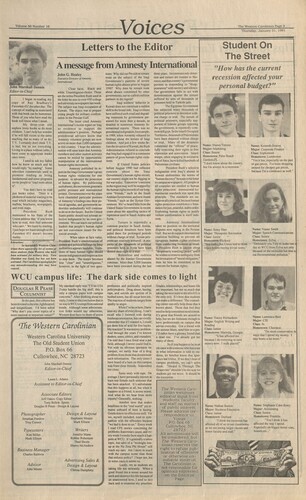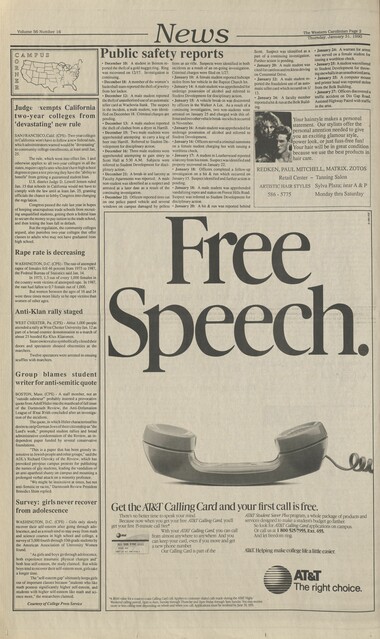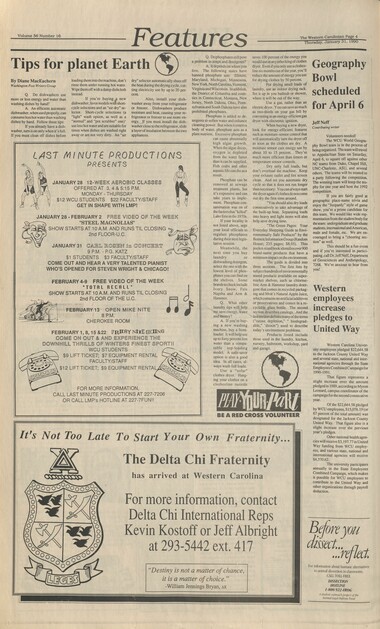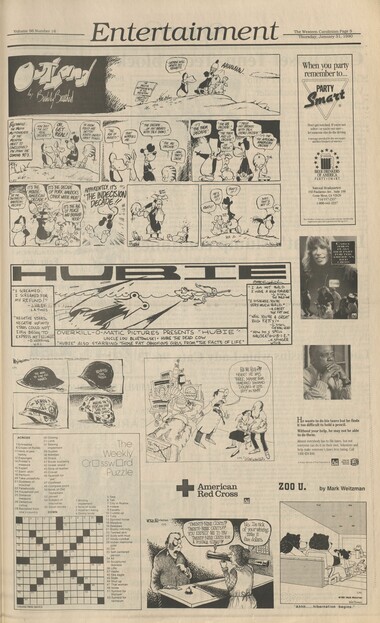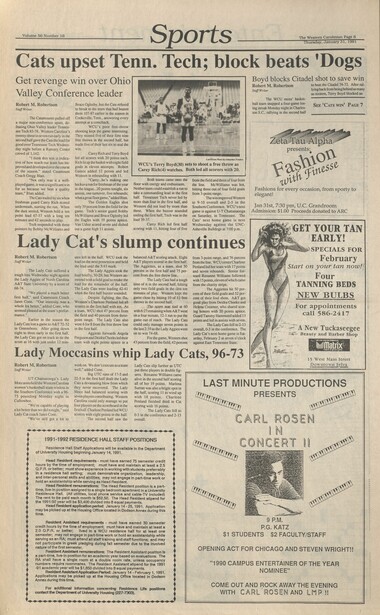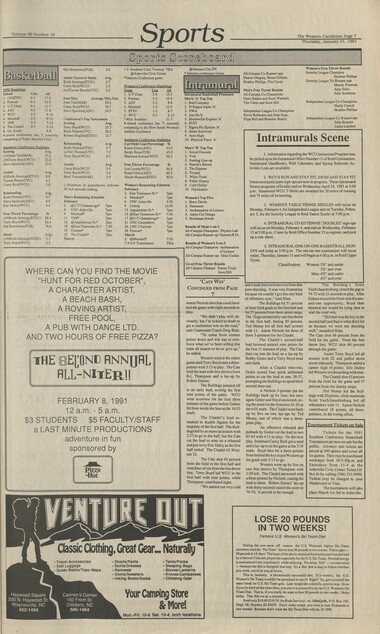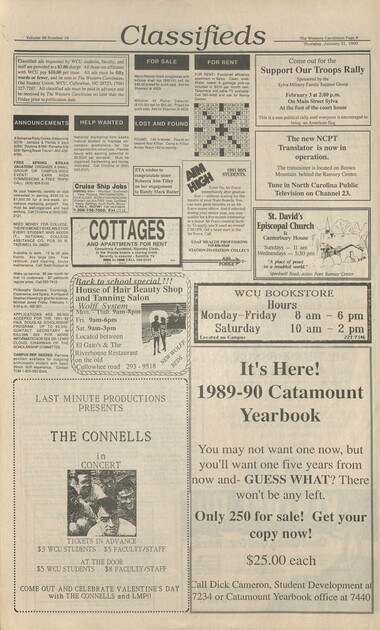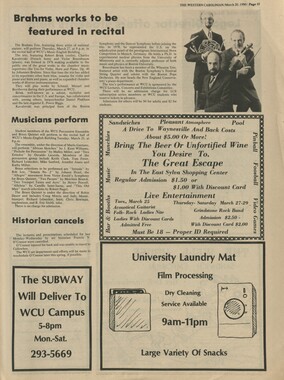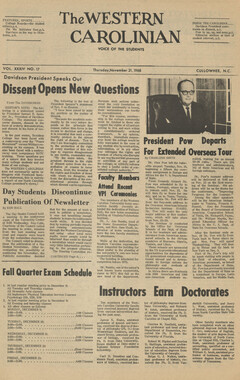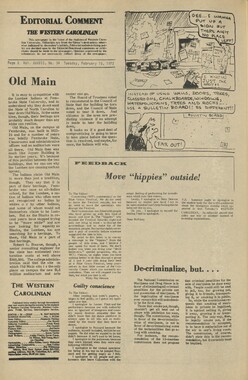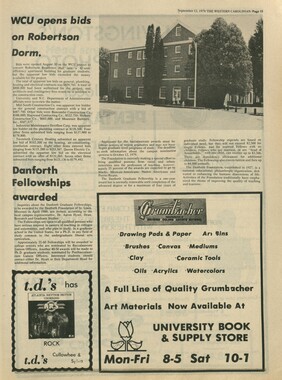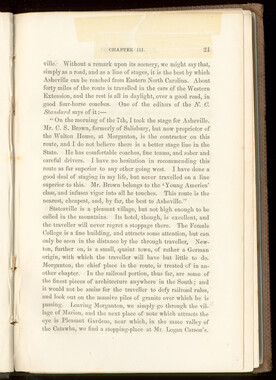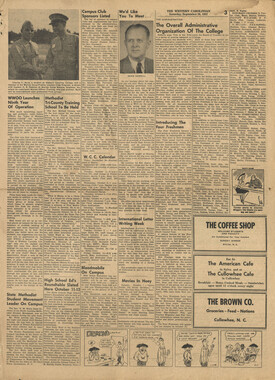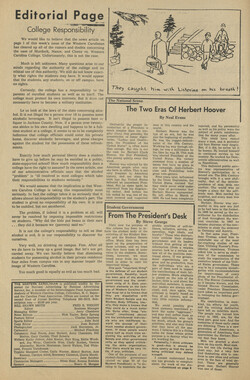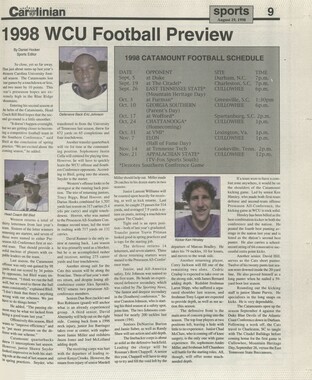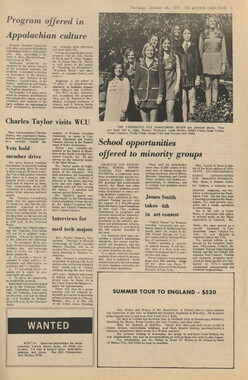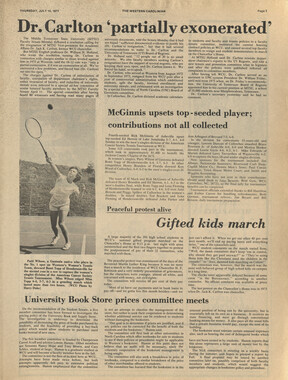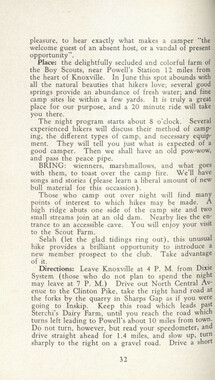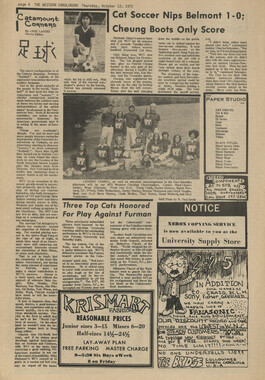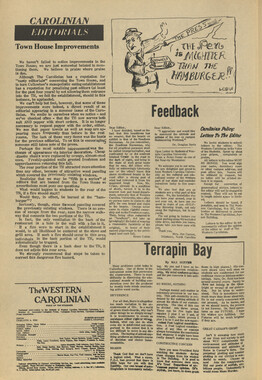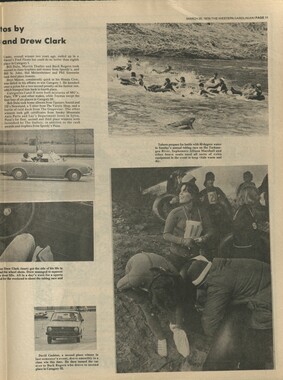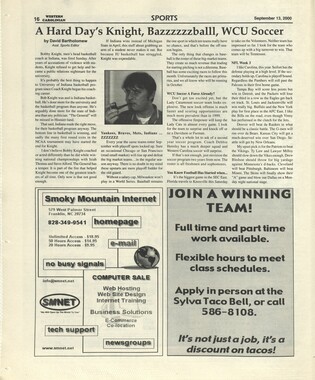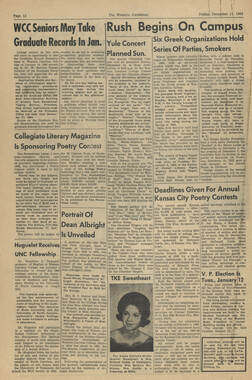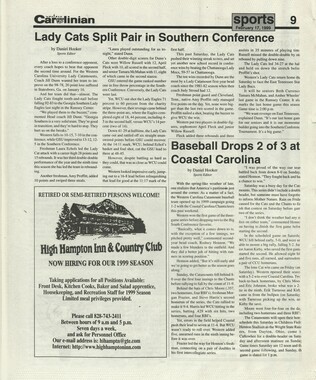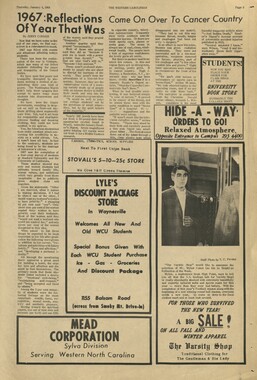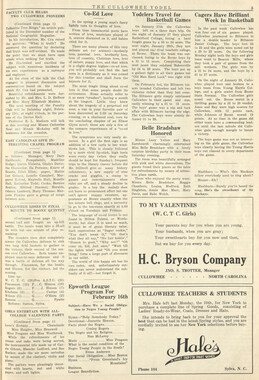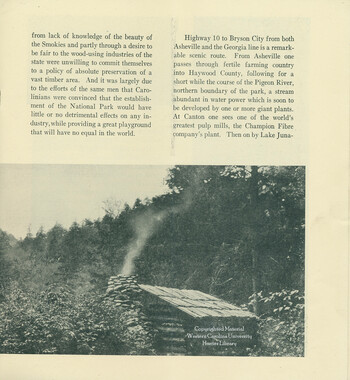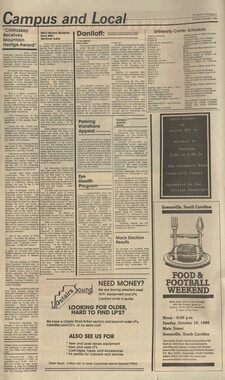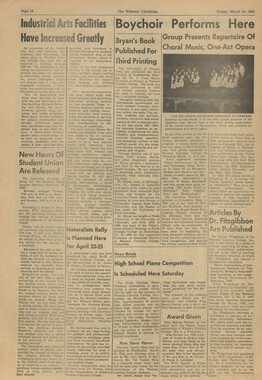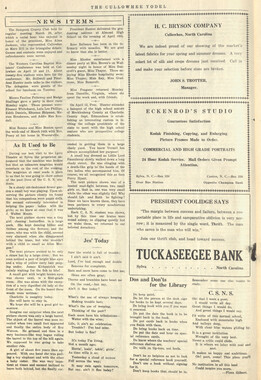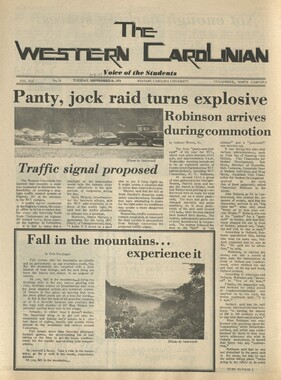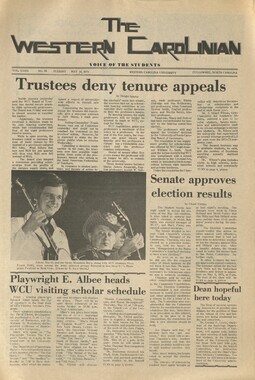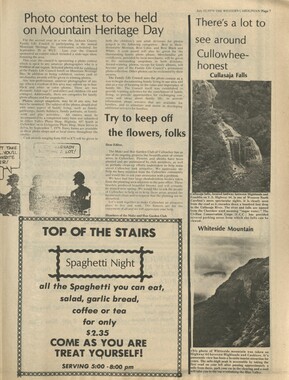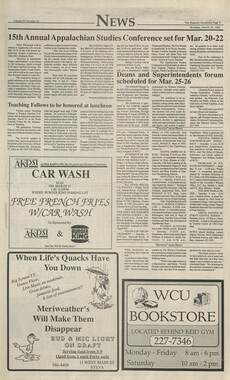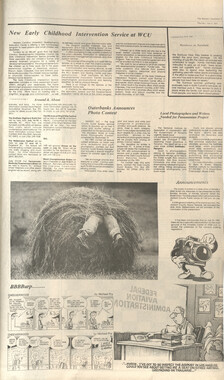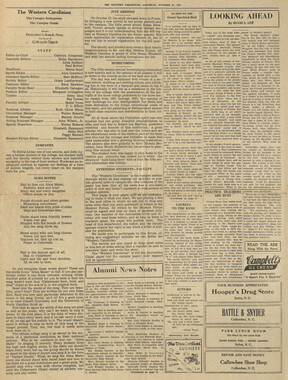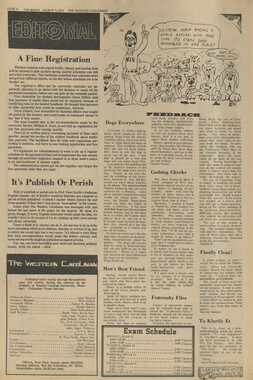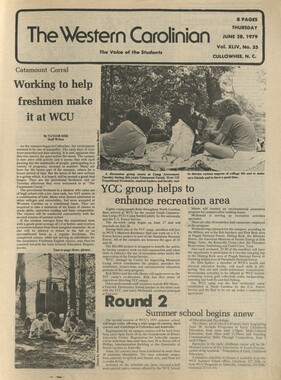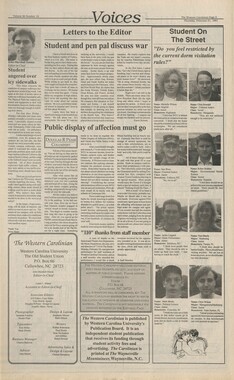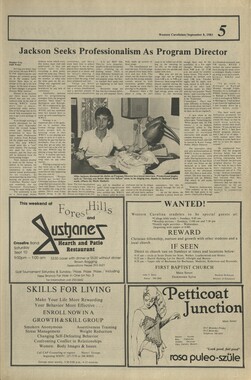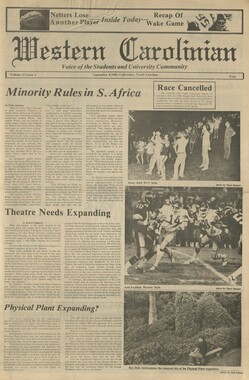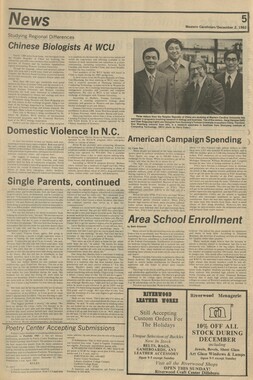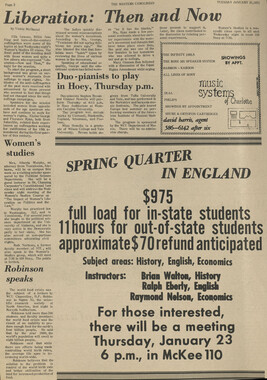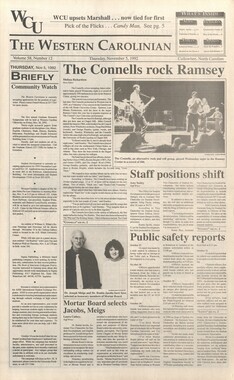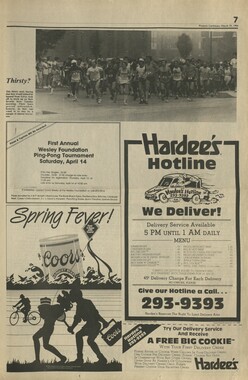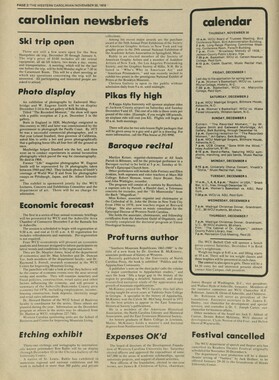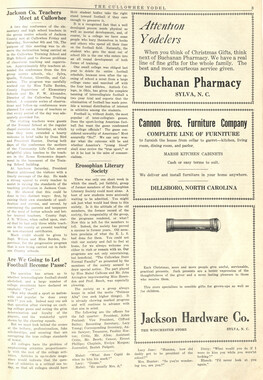Western Carolina University (20)
View all
- Canton Champion Fibre Company (2308)
- Cherokee Traditions (292)
- Civil War in Southern Appalachia (165)
- Craft Revival (1942)
- Great Smoky Mountains - A Park for America (2766)
- Highlights from Western Carolina University (430)
- Horace Kephart (941)
- Journeys Through Jackson (154)
- LGBTQIA+ Archive of Jackson County (85)
- Oral Histories of Western North Carolina (314)
- Picturing Appalachia (6772)
- Stories of Mountain Folk (413)
- Travel Western North Carolina (160)
- Western Carolina University Fine Art Museum Vitreograph Collection (129)
- Western Carolina University Herbarium (92)
- Western Carolina University: Making Memories (708)
- Western Carolina University Publications (2283)
- Western Carolina University Restricted Electronic Theses and Dissertations (146)
- Western North Carolina Regional Maps (71)
- World War II in Southern Appalachia (131)
University of North Carolina Asheville (6)
View all
- Western Carolina College (199)
- Western Carolina Teachers College (239)
- Western Carolina University (1792)
- Allanstand Cottage Industries (0)
- Appalachian National Park Association (0)
- Bennett, Kelly, 1890-1974 (0)
- Berry, Walter (0)
- Brasstown Carvers (0)
- Cain, Doreyl Ammons (0)
- Carver, George Washington, 1864?-1943 (0)
- Cathey, Joseph, 1803-1874 (0)
- Champion Fibre Company (0)
- Champion Paper and Fibre Company (0)
- Cherokee Indian Fair Association (0)
- Cherokee Language Program (0)
- Crittenden, Lorraine (0)
- Crowe, Amanda (0)
- Edmonston, Thomas Benton, 1842-1907 (0)
- Ensley, A. L. (Abraham Lincoln), 1865-1948 (0)
- Fromer, Irving Rhodes, 1913-1994 (0)
- George Butz (BFS 1907) (0)
- Goodrich, Frances Louisa (0)
- Grant, George Alexander, 1891-1964 (0)
- Heard, Marian Gladys (0)
- Kephart, Calvin, 1883-1969 (0)
- Kephart, Horace, 1862-1931 (0)
- Kephart, Laura, 1862-1954 (0)
- Laney, Gideon Thomas, 1889-1976 (0)
- Masa, George, 1881-1933 (0)
- McElhinney, William Julian, 1896-1953 (0)
- Niggli, Josephina, 1910-1983 (0)
- North Carolina Park Commission (0)
- Osborne, Kezia Stradley (0)
- Owens, Samuel Robert, 1918-1995 (0)
- Penland Weavers and Potters (0)
- Rhodes, Judy (0)
- Roberts, Vivienne (0)
- Roth, Albert, 1890-1974 (0)
- Schenck, Carl Alwin, 1868-1955 (0)
- Sherrill's Photography Studio (0)
- Smith, Edward Clark (0)
- Southern Highland Handicraft Guild (0)
- Southern Highlanders, Inc. (0)
- Stalcup, Jesse Bryson (0)
- Stearns, I. K. (0)
- Thompson, James Edward, 1880-1976 (0)
- United States. Indian Arts and Crafts Board (0)
- USFS (0)
- Vance, Zebulon Baird, 1830-1894 (0)
- Weaver, Zebulon, 1872-1948 (0)
- Western Carolina University. Mountain Heritage Center (0)
- Whitman, Walt, 1819-1892 (0)
- Wilburn, Hiram Coleman, 1880-1967 (0)
- Williams, Isadora (0)
- 1920s (57)
- 1930s (69)
- 1940s (114)
- 1950s (66)
- 1960s (314)
- 1970s (599)
- 1980s (406)
- 1990s (379)
- 2000s (195)
- 2010s (83)
- 1600s (0)
- 1700s (0)
- 1800s (0)
- 1810s (0)
- 1820s (0)
- 1830s (0)
- 1840s (0)
- 1850s (0)
- 1860s (0)
- 1870s (0)
- 1880s (0)
- 1890s (0)
- 1900s (0)
- 1910s (0)
- 2020s (0)
- Jackson County (N.C.) (2282)
- Appalachian Region, Southern (0)
- Asheville (N.C.) (0)
- Avery County (N.C.) (0)
- Blount County (Tenn.) (0)
- Buncombe County (N.C.) (0)
- Cherokee County (N.C.) (0)
- Clay County (N.C.) (0)
- Graham County (N.C.) (0)
- Great Smoky Mountains National Park (N.C. and Tenn.) (0)
- Haywood County (N.C.) (0)
- Henderson County (N.C.) (0)
- Knox County (Tenn.) (0)
- Knoxville (Tenn.) (0)
- Lake Santeetlah (N.C.) (0)
- Macon County (N.C.) (0)
- Madison County (N.C.) (0)
- McDowell County (N.C.) (0)
- Mitchell County (N.C.) (0)
- Polk County (N.C.) (0)
- Qualla Boundary (0)
- Rutherford County (N.C.) (0)
- Swain County (N.C.) (0)
- Transylvania County (N.C.) (0)
- Watauga County (N.C.) (0)
- Waynesville (N.C.) (0)
- Yancey County (N.C.) (0)
- Newsletters (510)
- Publications (documents) (1773)
- Aerial Photographs (0)
- Aerial Views (0)
- Albums (books) (0)
- Articles (0)
- Artifacts (object Genre) (0)
- Bibliographies (0)
- Biography (general Genre) (0)
- Cards (information Artifacts) (0)
- Clippings (information Artifacts) (0)
- Crafts (art Genres) (0)
- Depictions (visual Works) (0)
- Design Drawings (0)
- Drawings (visual Works) (0)
- Envelopes (0)
- Facsimiles (reproductions) (0)
- Fiction (general Genre) (0)
- Financial Records (0)
- Fliers (printed Matter) (0)
- Glass Plate Negatives (0)
- Guidebooks (0)
- Internegatives (0)
- Interviews (0)
- Land Surveys (0)
- Letters (correspondence) (0)
- Manuscripts (documents) (0)
- Maps (documents) (0)
- Memorandums (0)
- Minutes (administrative Records) (0)
- Negatives (photographs) (0)
- Newspapers (0)
- Occupation Currency (0)
- Paintings (visual Works) (0)
- Pen And Ink Drawings (0)
- Periodicals (0)
- Personal Narratives (0)
- Photographs (0)
- Plans (maps) (0)
- Poetry (0)
- Portraits (0)
- Postcards (0)
- Programs (documents) (0)
- Questionnaires (0)
- Scrapbooks (0)
- Sheet Music (0)
- Slides (photographs) (0)
- Songs (musical Compositions) (0)
- Sound Recordings (0)
- Specimens (0)
- Speeches (documents) (0)
- Text Messages (0)
- Tintypes (photographs) (0)
- Transcripts (0)
- Video Recordings (physical Artifacts) (0)
- Vitreographs (0)
- The Reporter, Western Carolina University (510)
- WCU Students Newspapers Collection (1744)
- A.L. Ensley Collection (0)
- Appalachian Industrial School Records (0)
- Appalachian National Park Association Records (0)
- Axley-Meroney Collection (0)
- Bayard Wootten Photograph Collection (0)
- Bethel Rural Community Organization Collection (0)
- Blumer Collection (0)
- C.W. Slagle Collection (0)
- Canton Area Historical Museum (0)
- Carlos C. Campbell Collection (0)
- Cataloochee History Project (0)
- Cherokee Studies Collection (0)
- Daisy Dame Photograph Album (0)
- Daniel Boone VI Collection (0)
- Doris Ulmann Photograph Collection (0)
- Elizabeth H. Lasley Collection (0)
- Elizabeth Woolworth Szold Fleharty Collection (0)
- Frank Fry Collection (0)
- George Masa Collection (0)
- Gideon Laney Collection (0)
- Hazel Scarborough Collection (0)
- Hiram C. Wilburn Papers (0)
- Historic Photographs Collection (0)
- Horace Kephart Collection (0)
- Humbard Collection (0)
- Hunter and Weaver Families Collection (0)
- I. D. Blumenthal Collection (0)
- Isadora Williams Collection (0)
- Jesse Bryson Stalcup Collection (0)
- Jim Thompson Collection (0)
- John B. Battle Collection (0)
- John C. Campbell Folk School Records (0)
- John Parris Collection (0)
- Judaculla Rock project (0)
- Kelly Bennett Collection (0)
- Love Family Papers (0)
- Major Wiley Parris Civil War Letters (0)
- Map Collection (0)
- McFee-Misemer Civil War Letters (0)
- Mountain Heritage Center Collection (0)
- Norburn - Robertson - Thomson Families Collection (0)
- Pauline Hood Collection (0)
- Pre-Guild Collection (0)
- Qualla Arts and Crafts Mutual Collection (0)
- R.A. Romanes Collection (0)
- Rosser H. Taylor Collection (0)
- Samuel Robert Owens Collection (0)
- Sara Madison Collection (0)
- Sherrill Studio Photo Collection (0)
- Smoky Mountains Hiking Club Collection (0)
- Stories of Mountain Folk - Radio Programs (0)
- Venoy and Elizabeth Reed Collection (0)
- WCU Gender and Sexuality Oral History Project (0)
- WCU Mountain Heritage Center Oral Histories (0)
- WCU Oral History Collection - Mountain People, Mountain Lives (0)
- Western North Carolina Tomorrow Black Oral History Project (0)
- William Williams Stringfield Collection (0)
- Zebulon Weaver Collection (0)
- College student newspapers and periodicals (1769)
- African Americans (0)
- Appalachian Trail (0)
- Artisans (0)
- Cherokee art (0)
- Cherokee artists -- North Carolina (0)
- Cherokee language (0)
- Cherokee pottery (0)
- Cherokee women (0)
- Church buildings (0)
- Civilian Conservation Corps (U.S.) (0)
- Dams (0)
- Dance (0)
- Education (0)
- Floods (0)
- Folk music (0)
- Forced removal, 1813-1903 (0)
- Forest conservation (0)
- Forests and forestry (0)
- Gender nonconformity (0)
- Great Smoky Mountains National Park (N.C. and Tenn.) (0)
- Hunting (0)
- Landscape photography (0)
- Logging (0)
- Maps (0)
- Mines and mineral resources (0)
- North Carolina -- Maps (0)
- Paper industry (0)
- Postcards (0)
- Pottery (0)
- Railroad trains (0)
- Rural electrification -- North Carolina, Western (0)
- School integration -- Southern States (0)
- Segregation -- North Carolina, Western (0)
- Slavery (0)
- Sports (0)
- Storytelling (0)
- Waterfalls -- Great Smoky Mountains (N.C. and Tenn.) (0)
- Weaving -- Appalachian Region, Southern (0)
- Wood-carving -- Appalachian Region, Southern (0)
- World War, 1939-1945 (0)
- Text (2283)
- MovingImage (0)
- Sound (0)
- StillImage (0)
Western Carolinian Volume 56 Number 16
Item
Item’s are ‘child’ level descriptions to ‘parent’ objects, (e.g. one page of a whole book).
-
-
Volume 56 Number 16 Voices The Western Carolinian Page 3 Thursday. January 31. 1991 P Letters to the Editor A message from Amnesty International John Marshall Dennis Editor-in-Chief I began re-reading my copy of Ray Bradbury's Farenheit451 the other day. The concept of reading as associated with that book can be bumerous. Those of you who have read the book will know what I mean. My three-year old nephew loves books as do most children. I can't help but wonder if he will fall victim lo the same maching that so many of us do: TV. I certainly don't think TV. is bad, but its not everything. Living in a place without cable, I have come to appreciate books once more. I used to ask my father how he knew so much and he would reply "by reading". Some television commercials used to promote reading as being fundamental and some programs invite people to "read more about it". You don't have to read just books either. There is a plethora of material waiting to be read which includes magazines, leaflets, brochures, newspapers, and even maps. President Bush mentioned in his State of the Union address that "if you know how to read, then find someone who can't." We learn by reading. I just hope we learn enough so tht Farenheit 451 doesn't become reality. Retraction: In last week's Western Carolinian there appeared a list of names of those students from Western who have been activated for military duty. Tara Sheridan was listed, but has not been activated. The Carolinian apologizes for any misunderstanding this may have caused. John G. Healey Executive Director of Amnesty International Clear facts. Black and white. Unambiguous choice. These are the terms President Bush used in the letter he sent to over 450 college and university newspapers last week. The subject was Iraqi occupation of Kuwait. The object was to prepare young people for military confrontation in the Persian Gulf. The letter cited Amnesty International's recent report on Iraq as evidence to support the administration's position. Perhaps presidential advisers know that Amnesty volunteer groups are now active on more than 2,600 campuses in this country. I hope the administration will soon learn that Amnesty members and other student activists cannot be misled by opportunistic manipulation of the international human rights movement. Amnesty published its report on the Iraqi Government's gross human rights violations for one purpose: to advance the protection of human rights. By publicizing such abuses, the movement generates public pressure and international protest. Governments over the years have channeled particular portions of Amnesty's findings into their political agendas, and government authorities undoubtedly will continue to do so in the future. But the United States public should not tolerate selective indignation by its own government. We can teach our political leaders that people's human rights are not convenient issues for rhetorical arsenals. When taken at face value, President Bush's condemnation of torture and political killings by Iraqi authorities appears laudable. Violations of basic human rights should arouse indignation and inspire action to stop them. The matter becomes less "clear" and "unambiguous," however, in the light of two ques tions: Why did our President remain mute on the subject of the Iraqi Government's patterns of severe human rights abuses prior to August 1990? Why does he remain mute about abuses committed by other governments, our so-called coalition partners in the region? Iraqi soldiers' behavior in Kuwait does not constitute a sudden shift to the brutal side. Iraqi civilians have suffered such cruel and degrading treatment by government personnel for more than a decade, as detailed in numerous Amnesty International reports. There was no presidential indignation, for example, in 1989, when Amnesty released its findings about the torture of Iraqi children. And just a few weeks before the invasion of Kuwait, the Bush Administration refused to conclude that Iraq had engaged in a consistent pattern of gross human rights violations. If United States policies before August 1990 had reflected concern about the Iraqi Government's human rights record, our country might not be digging in for war today. Tomorrow's tensions in the region may well be mapped by the human rights records of our long- term "friends," such as the Saudi Arabian Government, and new-found "friends," such as the Syrian Government. We've heard little from the United States Government in recent years about the appalling tactics of repression used in Saudi Arabia and Syria. Torture is reportedly a common practice in Saudi Arabia, and political detainees have been jailed there for prolonged periods without charge or trial. Syrian prisoners are routinely tortured. A majority of the thousands of political prisoners held in Syria have been denied their right to a trial. Relentless and ruthless abuses by the Iranian Government continue. More than 5,000 Iranians have been executed during the last three years. Incommunicado detention and torture are routine in Morocco, and that country' s government persists in responding to "disappearances" with secrecy and silence. Our government fails to act with determination against the torture suffered by tens of thousands of prisoners held in Turkish jails. The Egyptian Government has subjected many thousands of political prisoners to detention without charge or trial. The torture of political prisoners, especially sup- I porters of Islamic groups opposing the government, is reportedly common in Egypt. In the Israeli Occupied Territories, thousands of Palestinians have been detained without charge or trial. Many of the detainees committed the "offense" of peacefully exercising their rights to free expression and association. Israeli troops, often engaging in excessive use of force, have killed hundreds of Palestinian civilians. President Bush's selective indignation over Iraq's abuses in Kuwait undermines the norms of "human decency" he touts in his letter to campus newspapers. All people in all countries are entitled to human rights protection: international humanitarian standards rest upon this principle. The standards are unequivocally practical, because human rights protection establishes a foundation for just, peaceful, stable order. Exploiting human rights to justify violent confrontation is itself indecent. Amnesty International takes no position on the territorial disputes now raging in the Persian Gulf. But we do support international coalition building to prevent all egregious human rights violators from conducting business as usual. If President Bush is sincere about "desperately want[ing] peace" and if he wishes to remove ambiguity from his invocation of "moral obligation," then let him be consistent in his concern for human rights. WCU campus life: The dark side comes to light Douglas R Pease Columnist In the past, this column has been devoted to the trite, lighthearted, and insignificant. I'd been asked "Why don't you cover topics of a more national or important nature?" My standard reply was "I'll let USA Today handle the big stuff, this is only a campus paper with campus concerns." After thinking about my reply,Icame to the conclusion thatin no way is WCU exempt from national trends. Although some administrative folks would say otherwise, Western does have its share of sexist r T/te 'Western CaroCinian Western Carolina University The Old Student Union P.O. Box 66 Cullowhee, NC 28723 John Marshall Dennis Editor-in-Chief Laura L. Adams Assistant to Editor-in-Chief Associate Editors Jeff Oakes- Copy Editor Tony Bolick- Sports Douglas R Pease - Design & Layout \ Photographer Jonathan Fondow Troy Connor Typesetters Kim Miller Mark Ellison Business Manager Charles Baldwin Advisor John Moore Design & Layout Stephanie Messer Mark Ellison Writers Jennifer Mann Robbie Robertson Thad Shcrin Shawn McAndrew Advertising Sales & Design & Layout Christa Humphrey Vi J professors and politically inspired policymakers. Drug abuse, hazing, rape, and suicide are spoken of in hushed tones, but all occur here too. The reaction of students ranges from apathy to anger. While I've been here, I have seen my share of everything. I can't recall who I roomed with during freshman orientation.butcan vividly remember that if I wanted it, I could get three hits of acid for five bucks. My reaction? It was not my problem. And through the years I've known dealers, users, critics, and crusaders. I'm told that I once lived near a pot field, although I never could find it. Yet with its obvious openness on campus, we rarely hear of a drug problem from those that disseminate such information. The only times I have heard of a bust on this campus was from close friends. Sometimes too close. Same story with rape. On average I have personally known at least one female each semester that has been attacked. It's unfortunate that this happens at all, but when it happens to a friend, it seems worse. And what do we hear from news reports? Generally, nothing. Another item that makes headlines in the "real world" yet remains unheard of here is hazing. Greeks know its effects too well. Yet we, myself included, tend to sympathize with the offenders because "we had it done to us." Every week I read CPS stories concerning the problems fraternities cause, and every week I wonder how much it happens at WCU. It's generally a taboo topic, but tales of a "midnight lineup at the Nu Zeta Phi House" still reach my ears. Am I more in touch with the campus scene than those that enforce policy? I hope not, but in some cases, it seems so. Lastly, we as students are taking life too seriously. When a good friend ties a noose around his neck and destroys his life because of an unanswered love, I tend to step back and re-examine my priorities. Grades, relationships, and home life are important, but not so much that taking the next train to the afterlife is the only exit. It's here that students can make a difference. The counseling center can only help those that it knows about. Those that feel they need no help sometimes need it most. It's great that friends are around to help, but we are fortunate enough to have professionals on campus that advise everyday. Got a friend with the serious blues, send him to a pro. I'd rather have a gloomy friend than a dead one. I've already got too many of them. So if you happen to be in an elevator with someone who has a say in what information is told to students, let him/her know that ignorance isn't bliss. If we don't hear of campus problems, we can't solve them. "Heard It Through The Grapevine" shouldn't be the way we students get our news. It should be the exception. The Western Carolinian 'welcomes editorial input from students, faculty, and staff on matters of public interest. Please address correspondence to; Voices P.O. Box 66 Cullowhee, NC 28723 Ail submissions will be considered, but The Western Carolinian reserves the right to refuse publication of offensive or otherwise..unsuitable material. The Carolinian is hot responsible for opinions expressed on the Editorial Page. Student On The Street "How has the current recession affected your personal budget?" Name: Shawn Temme Major: Marketing Class: Senoir Hometown: Palm Beach Gardens,FL "I don't know about the country, but I'm always in a recession." Name: Kenneth Graves Major: Corporate Finance Class: Sophomore Hometown: Lumberton "Yes it has, especially on the part of gas prices. I've been shopping around for cheaper gas prices, because I'm a commuter as well" Name: Betsy Sher Major: Theraputic Recreation Class: Junior 4 Hometown: Hickory "Not really, but I have had to think twice before buying trivial items." Name: Vanne Smith Major: Speech Communications Class: Senior Hometown: Sylva "Definitely yes. I try to make one i day to WCU from Sylva not only because of the recession but also to cut Environmental pollution." M* Name: Tracey Richardson Major: English Writing and Reading Class: Junior Hometown: Marietta, Georgia "It has affected me because I do everyting to save money now. I walk places!" Name: Lawrence Bird Major: CIS Class: Sr. Hometown: Cherokee "I'm more conservative in ways that I spend my money. I stay home a lot more." Name: Nathan Burton Major: Business Education Class: Junior Hometown: Durham "I think the recession has affected all of us in our classrooms, as we are seeing larger classes and fewer faculty and staff." Name: Stephanie Cabe-Berry Major: Accounting Class: Senior Hometown: Franklin "Yes I think it has affected the way I spend. Especially on bigger items: cars, houses.etc..." J
Object
Object’s are ‘parent’ level descriptions to ‘children’ items, (e.g. a book with pages).
-
The Western Carolinian is Western Carolina University's student-run newspaper. The paper was published as the Cullowhee Yodel from 1924 to 1931 before changing its name to The Western Carolinian in 1933.
-

